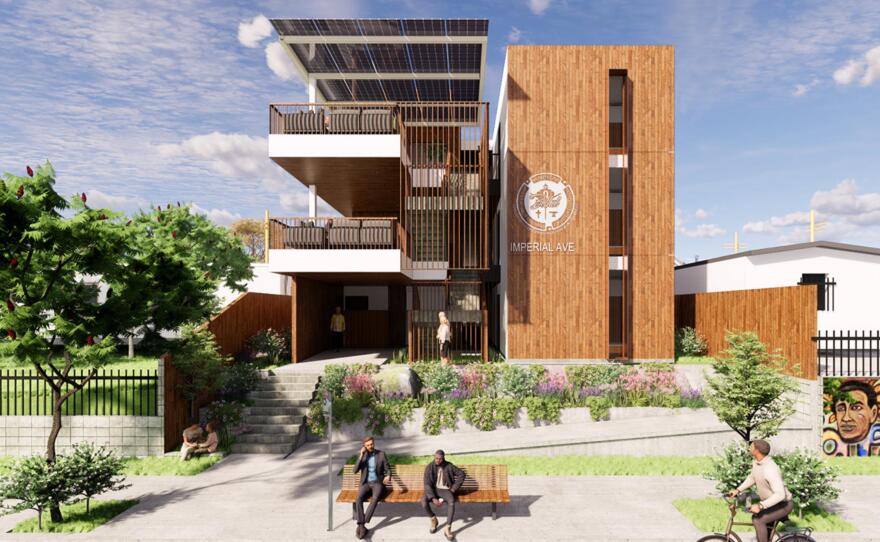Construction crews are beginning to pour the foundation on an affordable housing project in Logan Heights — the first project to emerge from San Diego’s budding “Yes in God’s Backyard” (YIGBY) movement.
Bethel One will offer 25 one-bedroom apartments set aside for low-income seniors and veterans, with one additional unit reserved for an on-site property manager. It’s being built by Bethel AME, a 136-year-old Black church.
Rev. Harvey Vaughn III, the church’s senior pastor, said he connected with YIGBY about five years ago. The group, which was formed under the nonprofit Catalyst of San Diego & Imperial Counties, was seeking faith communities interested in offering up their land to build affordable housing.
Bethel AME happened to own a roughly 7,000-square-foot lot on Imperial Avenue that was occupied by a small and aging duplex. Vaughn said the church’s collaboration with YIGBY was a match made in heaven.
“I think we should be applying the Gospel, which is the good news of Jesus Christ, to the situation,” Vaughn said of San Diego’s affordable housing crisis. “When I was hungry, did you feed me? When I was naked, did you cloth me? When I was homeless, did you house me? I really believe that churches have a tremendous responsibility to not just our congregation, but to the community in which our churches are located.”
Local and state lawmakers have shown a growing interest in using land that belongs to faith communities to build affordable housing. A report published in May 2020 from UC Berkeley’s Terner Center for Housing Innovation found faith communities in San Diego County have an estimated 4,675 acres of potentially developable land.
San Diego adopted reforms in 2019 that streamlined permitting for affordable housing projects on church parking lots. The reforms also allow churches and nonprofits in the city’s wealthiest neighborhoods to build affordable housing on their land, even when the underlying zoning doesn’t allow it.

The state legislature adopted a similar law last year called SB 4, which allows religious communities and nonprofit colleges to build affordable housing on their land regardless of the local zoning.
Bethel One faced several delays during the COVID-19 pandemic. Its original plan to use prefabricated units fell apart when the cost of those units went up. The project also had to raise roughly $1 million in donations.
“This is not a quick process,” Vaughn said. “To anyone who is interested in developing, you’re going to need some patience.”
Most affordable housing is built with government subsidies in the form of tax credits. But Evan Gerber, the project’s consultant, said Bethel One is funded entirely by private donations and loans.
“Government tax credits and public programs are a great tool to build affordable housing,” Gerber said. “The challenge with it is you really have to build a lot of units to really make it make sense. There’s also a lot of soft costs and additional fees that go into using public subsidy.”
Avoiding those additional costs associated with public subsidies, and keeping the project relatively small at three stories, allowed Bethel One to keep its cost per unit around $260,000. Publicly funded affordable housing projects in San Diego can cost $750,000 per unit or more.
Vaughn hopes that once Bethel One is completed by the end of the year, more San Diego philanthropists will be inspired to partner with faith communities to build privately funded affordable housing.
“I think that once the individuals that have committed financially see how this comes up … they will be very excited to invest in another development similar to this, and perhaps larger,” Vaughn said.
